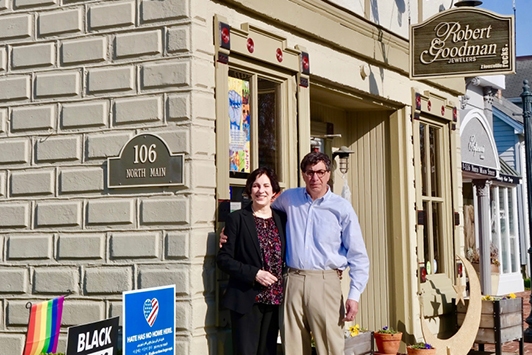 Image: Robert Goodman Jewelers
Image: Robert Goodman JewelersA quick look at the exterior of Robert Goodman Jewelers in Zionsville, Indiana, instantly reveals the proprietors’ position on social justice and peaceful coexistence. A rainbow flag and banners that read “Black Lives Matter” and “Hate Has No Home Here” by the entrance are clear signals. The owners, third-generation jeweler Bob Goodman and his wife Rose-Marie, opened the store in 2000, making it into a warm and welcoming community hub. Guns are banned, and a lending library and multi-faith event celebrations foster education and tolerance. Some of the jewelers’ core values include working with designers as partners, reducing the environmental impact of their business, and making sure their gems are responsibly sourced. “We believe that jewelry can make a positive difference” is one of the retailer’s mission statements.
Goodman is convinced his positions reach beyond political partisanship. “We have a very, very conservative industry. But I don’t think that being conservative or liberal has anything to do with this conversation,” he insists. “It’s the conversation of right and wrong.”
Reacting to racism
The couple took a strong stand for fair representation following the May 2020 murder of George Floyd at the hands of a police officer in Minneapolis, Minnesota. Goodman points out the “inexcusable” treatment of Black, Indigenous and people of color (BIPOC), stating that “the lack of fair and equal opportunities that we have seen historically in our industry is an abomination, and it’s something that we, as generational jewelers, should be embarrassed about.”
Another watershed moment for the retailer was the Russian invasion of Ukraine, which sparked conversations — some uneasy — with suppliers of melee diamonds, the category that the store’s featured designers use most. “Our challenge has not been purchasing loose [stones] in terms of melee, it’s been communicating [our position] since February 24,” Goodman says. “I feel guilty saying since February 24, because there were obviously issues that, personally and as an industry, we should have been more connected to — since 2014, when the eastern part of Ukraine and Crimea were taken over by the Russian Federation and President [Vladimir] Putin.... I feel guilty that we didn’t react to it, in the same way I feel guilty that we didn’t react to the systemic racism in our society and in our industry specifically.”
The Goodmans discussed sourcing with their suppliers in New York to make sure no stone from the Russian Federation, including miner Alrosa’s African production, would be part of their parcels from now on. They also don’t see Kimberley Process (KP)-certified goods as a guarantee anymore.
“The KP was a response to the outrage of blood diamonds…but what’s happening on the ground is much broader, and the human rights violations are much broader than what it addressed originally. It’s obsolete and needs to change,” Goodman declares.
Beyond sourcing
The jeweler looks to recycled and artisanally mined goods as an alternative. Eight years ago, Goodman and his wife started buying creations by designer Jennifer Dawes, an early proponent of ethical and sustainable sourcing.
“Rose-Marie and I made the decision that responsible jewelry was going to be the heart and soul of what we carried,” Goodman says.
They worked with consultant Christina Miller to set up a checklist explaining their sourcing process for their designers. The jeweler encourages the brands he carries to source stones from responsibly mined and traceable suppliers such as Anza, Nineteen48 and Capricorn Gems, and mark them up.
“They will make a profit, so I’m not trying to cut the designer’s profit out of this by buying directly and then supplying this stone to them, because that’s treating them as a partner,” explains Goodman.
The same ethos guides his purchasing strategy; he takes almost no goods on memo. “I think it is unconscionable for retailers to buy three pieces and then ask for 15 on consignment. They’re essentially telling small designers, ‘Be my bank, finance me.’” As a result, Goodman continues, designers go direct to consumers. “Retailers can complain about it, but we have made designers come up with a new model so they can survive.”
Goodman and his wife are happy to help other small retailers embrace a social responsibility strategy, he says. “We want to share with them to not be worried about losing value, about customers not coming in or trashing you on social media because of the position you’re taking. Take a position.”
Article from the Rapaport Magazine - June 2022. To subscribe click here.